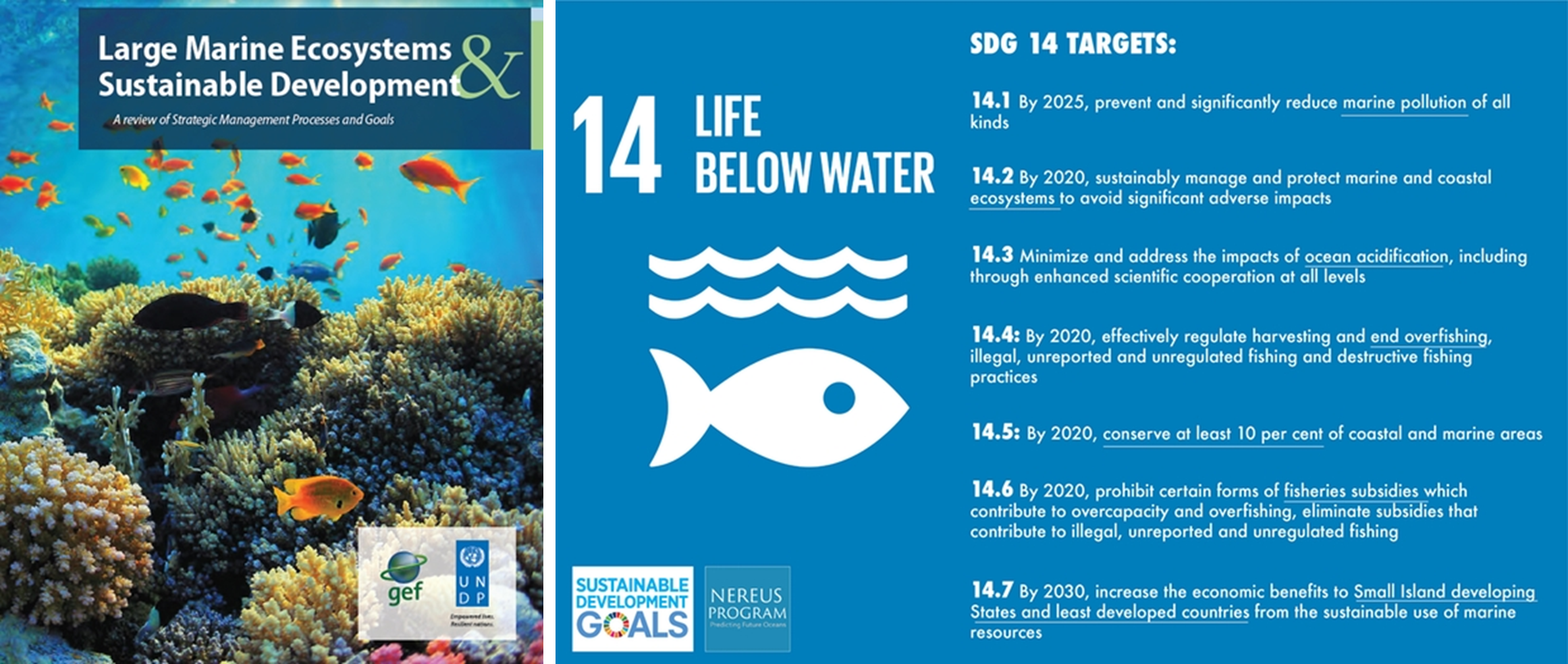Does the GEF-supported TDA-SAP process help countries achieve SDG14 targets?
A recently published UNDP report “Large Marine Ecosystems and Sustainable Development: A review of Strategic Management Processes and Goals” suggests that there is an intrinsic alignment between the Transboundary Diagnostic Analysis-Strategic Action Programme (TDA-SAP) Process and achievement of the Sustainable Development Goal 14 Targets and Indicators.
“With the newly adopted Sustainable Development Goals, especially SDG 14 on Oceans, UNDP recognised that it would be very timely and valuable to see how the LME management strategy development process was directly and indirectly addressing the targets of SDG 14 and how the TDA-SAP-LME process could even be improved to more effectively support implementation of these targets”- Andrew Hudson, Head, UNDP Water & Ocean Governance
The publication provides meticulous comparison between the LME SAP processes and several SDG 14 Targets. For example, SDG Target 14.1 requires that countries prevent and significantly reduce marine pollution of all kinds, in particular from land-based activities, including marine debris and nutrient pollution by 2050. According to the report, almost 90% of the LME TDAs recognise marine pollution to be an issue, thereby establishing a direct link between target 14.1 and the LME TDA-SAP Process. Although only one example, the report provides detailed analysis demonstrating that implementation of the TDA-SAP will significantly assist countries with the delivery of most, if not all, of the SDG 14 and other related SDGs.

Additionally, the report identifies numerous best practices in the TDA-SAP Process after two decades of trials and improvements. According to the report, the Process is not without constraints and provides a number of recommendations relating to its improvement. Some of the main urgencies identified include the need for more formal coordination arrangements and agreements on roles and responsibilities between mandated regional bodies, as well as anchoring the entire LME process within and under such agreements. The report also stresses the need for more effective translation of scientific results and information into adaptive management recommendations and policy guidance. Furthermore, the report highlights the need to intensify capacity development efforts in developing countries in relation to ocean and coastal management and Ecosystem Based Management.
“After 20 years of UNDP and other Implementing Agencies working with GEF on developing and implementing management strategies for Large Marine Ecosystems it was clearly time for this process to be reviewed in order to assess its effectiveness and to garner best lessons and practices as well as learn from any mistakes”- Dr. David Vousden, Lead Author
The publication includes six detailed annexes that provide comprehensive information on:
- the list of all TDAs and SAPs completed through GEF projects;
- a matrix template for information harvesting from the LME TDA-SAP processes;
- the frequency and ranking of threats, root causes, barriers and SAP response actions for all 23 LME projects supported by GEF as of mid-2017;
- the frequency of sustainability tools used for abovementioned LME projects;
- the relationship between the targets set for SDG 14 and the expected outcomes from the TDA-SAP Process;
- GEF leveraged co-financing commitments to the LMEs over the last 20 years through its International Waters and Multi-Focal Area portfolio.
The targeted audience that would benefit from this publication is diverse and includes project managers/chief technical advisors working on LMEs, UN agencies (UNDP, UNEP, FAO, UNIDO, UNESCO and others working on oceans), international financial institutions, national and sub-national marine resource managers, and management and staff of regional seas programmes.
The full report, titled “Large Marine Ecosystems and Sustainable Development: A review of Strategic Management Processes and Goals” was written by Dr. David H Vousden (Professor of Ocean Governance - Rhodes University, Senior Consultant to United Nations on Ocean and Coastal Management and Governance) with assistance from Lucy Scott, and edited by Andrew Hudson (UNDP).
*This article was originally posted on IWLEARN. Read the original story here.
